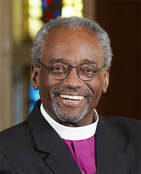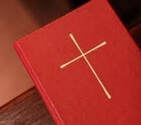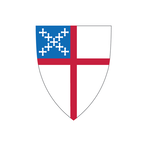WHO ARE EPISCOPALIANS? WHAT DO WE BELIEVE?
The Episcopal church uses the gifts of scripture, tradition, and reason to love, worship and understand our God & creator. We believe the Bible is the inspired revelation of God to humans, the preaching & faith of Jesus our template & liberation, with the active power of the Holy Spirit to guide and illuminate us in the study of scripture and our everyday experience. We are an inclusive church where all are welcome. We believe all people are equally loved by the creator and therefore are our community as is all of creation.
We are Christ-followers.
We are both Catholic and Protestant.
We search for truth via scripture, tradition and reason.
We are a Bible church, but we are not biblical literalists.
We are a sacramental church.
We are lay ministers, deacons, priests and bishops.
Our mission is to bring about the Kingdom of God on this earth.
We are members of the worldwide Anglican communion.
- We follow Jesus, the one we call “the Christ” (anointed one).
- Jesus shows us the Kingdom of God and God’s unconditional love for everyone.
We are both Catholic and Protestant.
- We trace our roots to the struggle in the English Church during the time of the Reformation.
- While the English church broke away from the papacy, it retained many of the Catholic traditions, but included many of the reforms of the protesters.
We search for truth via scripture, tradition and reason.
- We seek answers to questions of faith by trusting in the Holy Scripture.
- We also look for guidance from the teachings of the Church fathers and mothers who struggled with many of the same questions.
- A third resource for truth is our God-given ability to reason as it engages questions and responds to what is discovered through the Holy Scripture and the Church Tradition.
We are a Bible church, but we are not biblical literalists.
- A minimum of 2-3 readings from the Holy Scripture are proclaimed at every Episcopal worship service.
- We are encouraged to read the scripture every day and are given assigned readings. This tradition of the Daily Office dates to the early church. We are also encouraged to join a bible study group.
- We are not biblical literalists. In our study, we engage the scripture at three levels:
- The Story in its historical context;
- How the Story was heard by the faith community to whom it was written; and
- The Story speaking to us today.
We are a sacramental church.
- From the Catholic tradition, we retained the belief that our life as a faith community is centered on the sacraments of Baptism and Holy Eucharist (Communion).We believe these are important for the journey of a Christ follower.
- We also have continued the tradition of the other sacraments of Confirmation, Unction (Healing), Marriage, Reconciliation, and Holy Orders.
We are lay ministers, deacons, priests and bishops.
- We believe all Christ followers are to serve God in the world.
- Lay ministers take the teachings of our Jesus into their workplaces, their homes and their communities.
- Deacons are the voice reminding us to a life of serving others.
- Priests are to teach and preach the Word of God and celebrate the sacraments.
- Bishops are the overseers of a cluster of churches. Our Bishop leads all the churches in Hawaii
Our mission is to bring about the Kingdom of God on this earth.
- Jesus proclaimed the words of the prophet Isaiah, “The Spirit of the Lord is upon me, because he has anointed me to preach good news to the poor.He has sent me to proclaim freedom for the prisoners and recovery of sight for the blind, to release the oppressed, to proclaim the year of the Lord’s favor.”(LK4:18-19)
- We believe we are His body in the world and so we dedicate our lives to this mission.
We are members of the worldwide Anglican communion.
- We are in communion with Anglican churches throughout the world.

PRESIDING BISHOP MICHAEL B. CURRY
The Most Rev. Michael Bruce Curry is Presiding Bishop and Primate of the Episcopal Church. He is the Chief Pastor and serves as President and Chief Executive Officer, and as Chair of the Executive Council of the Episcopal Church.
Presiding Bishop Curry was installed as the 27th Presiding Bishop and Primate of the Episcopal Church on November 1, 2015. He was elected to a nine-year term and confirmed at the 78th General Convention of the Episcopal Church in Salt Lake City, UT, on June 27, 2015.
The Most Rev. Michael Bruce Curry is Presiding Bishop and Primate of the Episcopal Church. He is the Chief Pastor and serves as President and Chief Executive Officer, and as Chair of the Executive Council of the Episcopal Church.
Presiding Bishop Curry was installed as the 27th Presiding Bishop and Primate of the Episcopal Church on November 1, 2015. He was elected to a nine-year term and confirmed at the 78th General Convention of the Episcopal Church in Salt Lake City, UT, on June 27, 2015.

THE BOOK OF COMMON PRAYER
Our worship is based on the Book of Common Prayer. The service follows the oldest Christian tradition. The words and images contained in our worship are not so much an end-point of what our thoughts about the Sacred should be. Instead, they may be heard as a beginning, allowing us to ponder what we believe about our God. There are hymns and other music which touch us in ways words alone cannot. For further exploration of the teaching of the Episcopal Church can be found in the Church's Catechism: (http://www.bcponline.org, click on "The Catechism"). Here the teachings and beliefs of the Episcopal Church are articulated in this "Outline of the Faith." It is designed in a question and answer format.
Our worship is based on the Book of Common Prayer. The service follows the oldest Christian tradition. The words and images contained in our worship are not so much an end-point of what our thoughts about the Sacred should be. Instead, they may be heard as a beginning, allowing us to ponder what we believe about our God. There are hymns and other music which touch us in ways words alone cannot. For further exploration of the teaching of the Episcopal Church can be found in the Church's Catechism: (http://www.bcponline.org, click on "The Catechism"). Here the teachings and beliefs of the Episcopal Church are articulated in this "Outline of the Faith." It is designed in a question and answer format.

THE EPISCOPAL SHIELD
The founding fathers of the Episcopal Church were also the founding fathers of our country, and the shield's red, white, and blue colors and layout are similar to that of the American flag. Red represents the blood Christ shed for us; white symbolizes purity, and blue is the traditional color of the Virgin Mary. The large red cross that divides the shield is a cross of St. George, the cross of the Church of England, that represents our ties to the mother church. The nine small crosses in the upper left quadrant represents the nine dioceses that founded the Episcopal Church in 1789, and are arranged in a St. Andrew's cross, the cross of the Church of Scotland. When no Anglican bishop would ordain a bishop for the new church in America, bishops of the Church of Scotland agreed to lay hands on Samuel Seabury, ordaining him the first bishop of the Episcopal Church. This cross honors the role that the Church of Scotland played in the birth of our church.
The founding fathers of the Episcopal Church were also the founding fathers of our country, and the shield's red, white, and blue colors and layout are similar to that of the American flag. Red represents the blood Christ shed for us; white symbolizes purity, and blue is the traditional color of the Virgin Mary. The large red cross that divides the shield is a cross of St. George, the cross of the Church of England, that represents our ties to the mother church. The nine small crosses in the upper left quadrant represents the nine dioceses that founded the Episcopal Church in 1789, and are arranged in a St. Andrew's cross, the cross of the Church of Scotland. When no Anglican bishop would ordain a bishop for the new church in America, bishops of the Church of Scotland agreed to lay hands on Samuel Seabury, ordaining him the first bishop of the Episcopal Church. This cross honors the role that the Church of Scotland played in the birth of our church.



